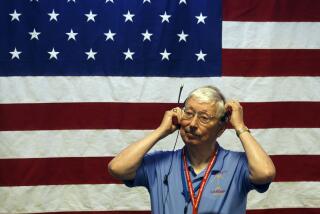JPL Chief Finds Retirement Gift Is Just Heavenly
- Share via
PASADENA — Lew Allen’s retirement gift will bear his name, but isn’t a plaque or a gold watch. In fact, his gift is larger than a Winnebago, and covers considerably more miles in a year.
Allen, the retiring director of the Jet Propulsion Laboratory, had an asteroid named in his honor.
The announcement came at a farewell reception last week at JPL for Allen, a former member of the Armed Forces Joint Chiefs of Staff.
Asteroid 4125, henceforth known as “Lew Allen,” has a diameter of about eight miles and circles the sun every 2.6 years in an orbit that generally places it somewhere between the orbits of Jupiter and Mars.
The asteroid was discovered on June 28, 1987, by Eleanor Helin at the Caltech Palomar Observatory. JPL is a government Earth science and astrophysics research installation, which is operated by Caltech for the National Aeronautics and Space Administration.
“This particular astronomer is one of the world’s leading discoverers of asteroids,” said JPL spokeswoman Mary Hardin. “There are dozens, if not hundreds of asteroids to be chosen from. They all need names. This was just something nice (JPL) wanted to do for him.”
Allen called the honor “heavenly,” and added, “I’m very flattered Helin saw fit to take one of her discoveries and attach my name to it.”
In its travels, asteroid Lew Allen will cross orbits with a number of craft shepherded into space under the leadership of JPL’s outgoing director.
Allen, 65, became director in 1982. He oversaw the progress of the Voyager probe past Uranus and Neptune. Galileo, launched in 1989, will begin orbiting Jupiter in 1995. Magellan spacecraft, also launched in 1989, is mapping Venus.
Edward Stone, the Caltech physics professor who was project scientist for the Voyager mission, will succeed Allen.
Future JPL projects include unmanned orbital missions to Mars and Saturn. Allen also was credited with encouraging research partnerships between Caltech and JPL, and pushing the development of microelectronic technology, said Clarence Gates, JPL’s associate director, who also is retiring.
“If we were a business, you could say our backlog of orders is excellent,” Gates said. “For the next three to five years, I think the challenge is carrying out the commitments we’ve made.”
Before coming to JPL, Allen was Air Force chief of staff and a member of the Joint Chiefs of Staff in the Pentagon. He was a command pilot with more than 4,000 flying hours in aircraft such as the B-29 and B-36.
As a scientist, Allen, who holds a doctorate in physics, researched the effects of nuclear explosions in the upper atmosphere.
“You think of a four-star general and you have this vision of military order and commands, and he’s not that way at all,” Gates said. “He operates by giving advice and establishing guidelines. He stepped into this community of engineers and science faculty very well. Not many people can get along with that diversity.”







